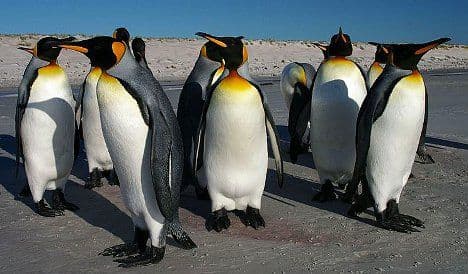Penguins get stressed by humans: Swiss study

Humans make king penguins stressed, but the regal birds chill out over time as they get more used to people's presence, a Swiss study shows.
Researchers compared two groups of king penguins on Possession Island in the subantarctic Crozet Archipelago.
One group of 15 penguins was breeding in areas disturbed daily by humans. The other group, made up of 18 birds, was breeding in an undisturbed area. Both groups were brooding chicks.
The researchers carried out tests to mimic tourist and researcher behaviour. They let off a loud noise, and approached the penguins to within ten metres. A third more stressful test involved the capture of the animal, which was intended to replicate the effect caused by researchers taking measurements.
Stress was measured by monitoring the penguins' heart rate.
In all cases, the penguins already exposed to human presence showed less signs of stress except when captured, when their heat rate rose by 42 percent. Despite this increase, the exposed penguins recovered faster after capture than the undisturbed penguins.
“Our findings report a case of physiological adjustment to human presence in a long-studied king penguin colony, and emphasize the importance of considering potential effects of human presence in ecological studies,” lead author Vincent Viblanc from the University of Lausanne said in a statement.
Viblanc headed a team that also included researchers from the University of Strasbourg and the Centre National de la Recherche Scientifique in France.
The researchers queried whether the diversity of the penguin populations would be affected by exposure to humans, such that more stress-sensitive individuals would leave the group in search of undisturbed areas.
The study was particularly important because of the increase in the number of Antarctic tour groups to the relevant areas.
“A central question for ecologists is the extent to which anthropogenic disturbances (e.g. tourism) might impact wildlife and affect the systems under study,” Viblanc said.
The study's findings are to be published in the BMC Ecology journal.
Join the conversation in our comments section below. Share your own views and experience and if you have a question or suggestion for our journalists then email us at [email protected].
Please keep comments civil, constructive and on topic – and make sure to read our terms of use before getting involved.
Please log in here to leave a comment.